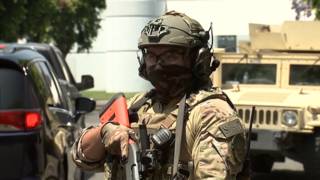
Israel launched surprise airstrikes in Gaza overnight, targeting three commanders of the Islamic Jihad militant group, who were assassinated in their homes. The attacks killed a total of 13 people, including the wives and children of the men. The Israeli attack broke a ceasefire that had been reached last week after a spike in violence following the death of Palestinian prisoner Khader Adnan in Israeli custody. “As the occupying power, Israel has the obligation to protect the civilian population,” says Phyllis Bennis, author and fellow at the Institute for Policy Studies. “Instead, we’re seeing the expansion of an apartheid regime, and one which is prepared to use violence at extraordinary levels without a moment’s hesitation.”
Transcript
AMY GOODMAN: Phyllis, before you go, I want to ask you about Gaza. Overnight, Israel launched surprise airstrikes in Gaza, targeting three commanders of the Islamic Jihad, assassinated in their homes. The attacks killed a total of 13 people, including the wives and children of the commanders. The Israeli attack broke a ceasefire that had been reached last week after a spike in violence following the death of the Palestinian prisoner Khader Adnan in Israeli custody, who had been on hunger strike for 87 days. In this last minute we have, can you comment on what’s been happening?
PHYLLIS BENNIS: This is a horrific example once again of Israel, in a long history, not only since this new extraordinarily far, far extremist right-wing government has taken power — this has been the case before in the willingness to attack Gaza, to attack civilians. And this was an attack on a residential apartment building. It was no surprise, in the middle of the night, that children were among the dead, that people were killed in their beds. And the fact that three of them are alleged to have been commanders of the Islamic Jihad organization does not give Israel the right to carry out this kind of extrajudicial killing, this kind of assault, this kind of murder by bomb, when there is knowledge that there will be civilian casualties.
There is a desperate need to go back, first of all, to the ceasefire. Israel’s violation of it was clear and unequivocal. This was a complete violation of international law, international human rights law and international humanitarian law. As the occupying power, Israel has the obligation to protect the civilian population. That’s across the board. It doesn’t matter what other forces are negotiating with it, whether there are negotiations underway or not. That is Israel’s obligation as the occupying power. Instead, we’re seeing the expansion of an apartheid regime, and one which is prepared to use violence at extraordinary levels without a moment’s hesitation. And it’s a complete violation, and the U.S. should stop its military support as a result.
AMY GOODMAN: Phyllis Bennis, we thank you so much for being with us, author and fellow at the Institute for Policy Studies.
When we come back, we go to Sudan, where the humanitarian crisis is worsening as fighting between the rival military factions enters its 25th day. Stay with us.












Media Options